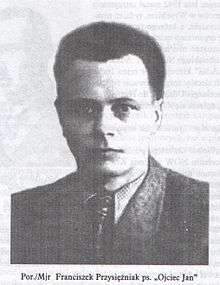Franciszek Przysiężniak

Franciszek Przysiężniak (nom de guerre "Ojciec Jan", "Father John") (September 22, 1909 in the village of Krupe, near Krasnystaw – September 30, 1975 in Jarosław) - was a lieutenant in the Polish Army, an officer of anti-communist resistance groups National Military Organization (NOW) and National Military Union (NZW).
Przysiężniak finished the Volhynian School for Reserve Cadets of Artillery in Włodzimierz Wołyński in 1938. He then began his military service in the 16th Pomeranian Regiment of Light Artillery in Grudziądz. He took part in the Invasion of Poland in 1939, against the Nazi invaders. On September 28, 1939, he was captured by the Germans at Tomaszów Lubelski, but on his way to the POW camp he managed to escape. In 1942 he joined the National Military Organization and was made the commander of its units in the Krasnystaw county. He headed a unit that specialized in diversion and sabotage which later the merger with the Home Army (AK-NOW). Eventually, he was promoted to the rank of major.
During World War II, the partisan unit led by "Father John", which operated in the region of Janów Forests was one of the best armed units of the Polish anti-Nazi underground. On June 14, 1944, under his leadership it took part in one of the largest battles between German forces and Polish partisans, at Porytowe Wzgorze which was part of the Sturmwind I operation carried out by the Nazis.
After the Red Army entered Poland he was forced to go into hiding. On April 1945 in Kuryłówka his wife, Janina Przysiężniak Jaga, who was seven months pregnant was murdered, with a shot to the back of the head, by the communist secret police (UB).[1] As a result, he organized a group of anti-communist fighters in the "San" region.[2] On the 7th of May this unit fought in one of the largest battles between Soviet NKVD and the Polish underground, the Battle of Kuryłówka,[3] in which 57 NKVD soldiers were killed and their operational group dispersed. In the fall of 1945 he moved to Pomerania where he was made the commander of all NZW units in Brodnica and Wąbrzeźno counties. He was arrested on May 15, 1946 and sentenced to four years in prison. He was released during the Amnesty of 1947, but a year later arrested again. This time his sentence was 15 years in prison. He was released again on December 24, 1954.
He was a recipient of the Silver Cross of the Virtuti Militari.[4]
References
- ↑ Marek Jan Chodakiewicz, "The Dialectics of Pain: The Interrogation Methods of the Communist Secret Police in Poland, 1944-1955", Glaukopis, vol. 2/3 (2004-2005),
- ↑ "Andrzej Kiszka - ostatni partyzant " (Andrzej Kiszka - the last of the partisans), Tygodnik Lobeski, 10/13/08,
- ↑ IPN, "Wystawa „Żołnierze wyklęci. Antykomunistyczne podziemie na Rzeszowszczyźnie po 1944 roku" (Exhibition: Cursed Soldiers. Anti-communist underground in the Rzeszow region after 1944),
- ↑ Lista nazwisk osób odznaczonych Orderem VIRTUTI MILITARI (List of persons decorated with the Order Virtuti Militari),